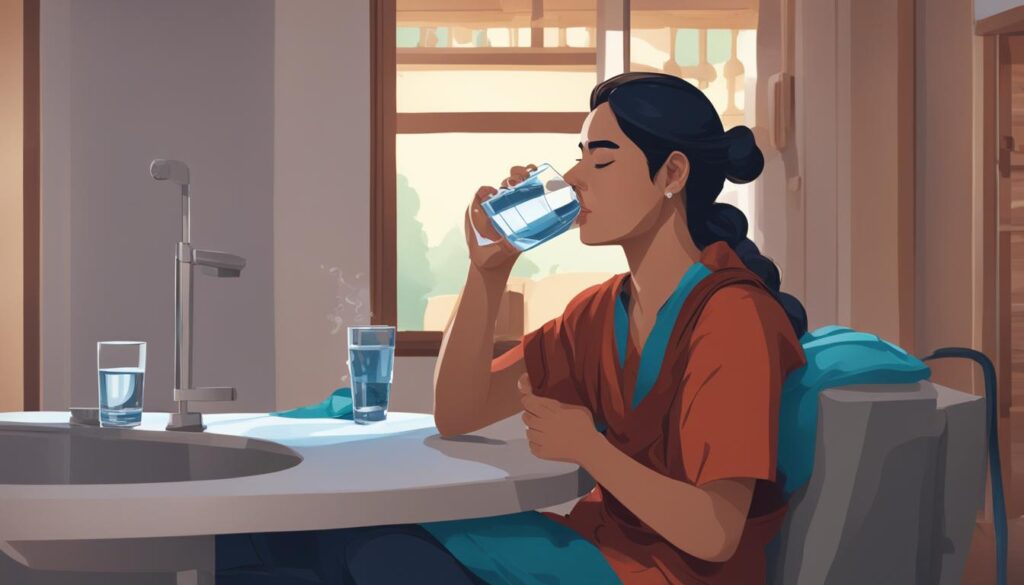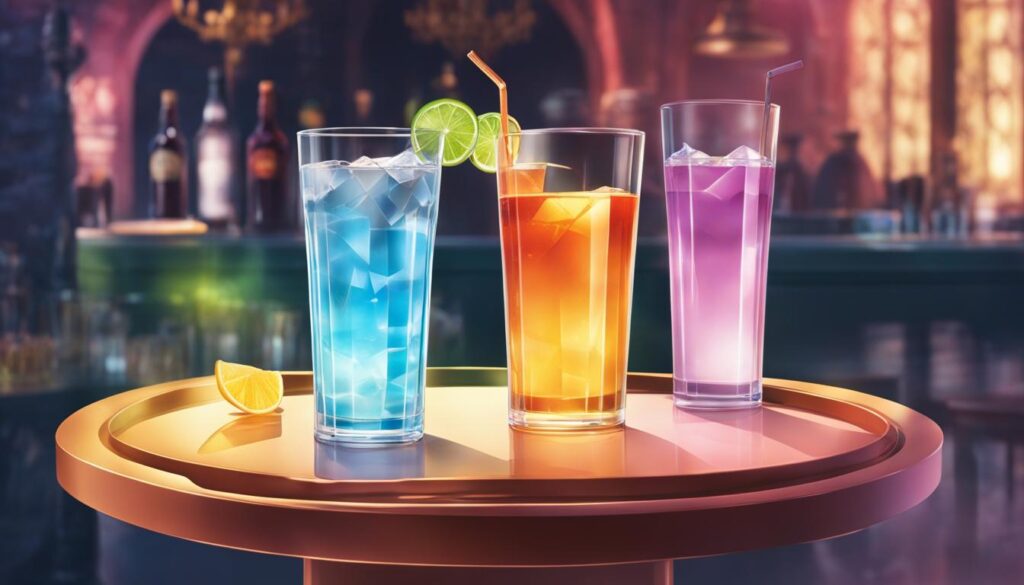When it comes to fasting, many people wonder if drinking water is allowed. In this article, I will provide you with key insights into what happens when you drink water while fasting. Let’s explore the effects of drinking water during fasting and whether you can consume water while abstaining from food.
Key Takeaways:
- Drinking water while fasting is recommended to avoid dehydration.
- Water helps maintain hydration and supports various body processes.
- Drinking water during fasting may help reduce hunger.
- Non-caloric beverages like lemon water, unsweetened tea, and flavored seltzer water are generally safe to consume while fasting.
- It is important to avoid calorie-containing beverages during fasting hours to prevent insulin activation.
Can You Drink Water While Fasting?
When it comes to fasting, one common question that arises is whether or not you can drink water. The answer is yes, you can drink water while fasting. In fact, it is highly recommended to stay hydrated during fasting periods to ensure optimal health and well-being.
Water is essential for maintaining hydration and supporting various body processes. Going without any fluid for an extended period of time can lead to dehydration, which can have negative effects on your overall health. Therefore, it is important to drink water regularly during fasting hours.
Aim to drink at least two quarts of water per day, even during fasting periods. This will help to quell hunger and ensure that your body is properly hydrated. Water does not break a fast, so you can continue to consume it throughout your fasting period without any negative consequences.
Is Drinking Water Allowed in Fasting?
Yes, drinking water is allowed and encouraged during fasting. While you may be abstaining from food or certain types of food, it is important to remember that water is essential for proper hydration and overall health.
| Fasting | Water Consumption |
|---|---|
| Intermittent Fasting | Drinking water is highly recommended |
| Extended Fasting | Drinking water is essential |
Whether you are practicing intermittent fasting or an extended fast, it is crucial to drink water to ensure that your body stays hydrated. Water supports important bodily functions and can help reduce hunger during fasting periods.
Effects of Drinking Water During Fasting
Drinking water during fasting can have several beneficial effects on the body. One of the main advantages is that it helps maintain hydration, which is essential for overall health and well-being. When fasting, the body may become dehydrated due to the lack of fluid intake. By drinking water, individuals can replenish lost fluids and prevent dehydration. Staying hydrated is particularly important during fasting, as dehydration can lead to various health issues.
Another advantage of drinking water during fasting is its impact on hunger levels. Water consumption has been shown to help reduce feelings of hunger, making it easier for individuals to stick to their fasting goals. When the stomach feels empty, drinking water can provide a temporary feeling of fullness and help curb appetite. This can be especially helpful for those who find it challenging to go without food for extended periods.
“Water consumption during fasting has additional benefits beyond hydration and hunger control.”
Water consumption during fasting has additional benefits beyond hydration and hunger control. Unlike other beverages, water does not have an insulinemic response, which means it does not trigger the release of insulin. This makes it suitable for individuals fasting for medical purposes, such as those with diabetes. Water can be consumed without disrupting the fasting state or negatively affecting blood sugar levels.
While there are clear benefits to drinking water during fasting, it is important to avoid calorie-containing beverages. These can activate insulin and break the fast. Instead, non-caloric beverages like lemon water, unsweetened tea, and flavored seltzer water are generally considered safe to consume while fasting. It is important to choose beverages that do not contain any added sugars or calories to ensure the fasting state is maintained.
Overall, drinking water during fasting can have positive effects on hydration, hunger levels, and insulin response. It is essential to prioritize staying hydrated and choose non-caloric beverages to support overall well-being during fasting periods.
Water Consumption and Intermittent Fasting
When it comes to intermittent fasting, water consumption plays a vital role in supporting the body’s functions and overall well-being. While fasting, it is important to stay hydrated to maintain optimal health. Drinking water during fasting hours does not break the fast, making it an excellent choice for hydration. However, it is crucial to consider the goals of your fasting, especially if weight loss is your objective.
Table: Comparing Water Consumption During Intermittent Fasting
| Water Consumption | Advantages | Disadvantages |
|---|---|---|
| Regular Water Intake | – Maintains hydration – Supports body processes – Helps reduce hunger |
– Does not break the fast |
| Calorie-Containing Beverages | – May provide energy – Can be a source of essential nutrients |
– Can break the fast – May activate insulin response |
While water does not have calories or impact insulin levels, other beverages such as calorie-containing drinks should be consumed with caution during fasting periods. These beverages, even when low in calories, can break the fast and activate the body’s insulin response. It is important to note that a caloric deficit is crucial for weight loss during fasting. Therefore, if weight loss is the primary goal, it is recommended to choose non-caloric options such as water, unsweetened tea, flavored seltzer water, or black coffee.
The Role of Hydration in Fasting
Hydration is essential during fasting as it helps support various body processes and prevents dehydration. When the body is deprived of calories, it relies on stored fat for energy, and as fat is broken down, water is released. This makes drinking water even more important to maintain hydration levels throughout the fasting period.
“Staying hydrated during fasting periods is crucial for optimal health and well-being.”
– Registered Dietitian, Jane Smith
In summary, water consumption is a key component of intermittent fasting. It helps maintain hydration, supports the body’s functions, and can help reduce hunger. Non-caloric beverages like water, unsweetened tea, flavored seltzer water, and black coffee are generally safe options during fasting. However, it is important to consider your fasting goals and avoid calorie-containing beverages to achieve the desired results.

What Other Beverages Can You Drink During Fasting?
In addition to water, there are other beverages you can safely consume during fasting hours. These options provide variety while ensuring you stay hydrated and maintain the benefits of fasting. Here are some of the recommended beverages:
- Hot tea: Enjoy a cup of hot tea, such as green tea or herbal tea, without added sweeteners or milk. This can provide warmth and a soothing effect during fasting.
- Black coffee: A cup of black coffee, without any cream or sugar, can help boost your energy and focus while fasting. Just be mindful of your caffeine intake and consider any potential sensitivities.
- Seltzer water: Sparkling water or flavored seltzer water can be a refreshing choice if you prefer some fizziness. Look for options without added sugars or artificial sweeteners.
- Iced tea: If you prefer a cold beverage, unsweetened iced tea can be a great choice. Opt for herbal or black tea without any sweeteners or additives.
- Tea or coffee with stevia: If you prefer a bit of sweetness in your tea or coffee, you can use stevia, a natural zero-calorie sweetener. Just be sure to use it in moderation.
These beverages can help add flavor and variety to your fasting routine without significantly impacting your blood sugar or insulin levels. Remember to avoid calorie-containing beverages, as these can break your fast and potentially interfere with your fasting goals.

Following the recommended fasting protocol is crucial to the success and safety of the medical procedure. Fasting helps minimize the risk of aspiration, which occurs when stomach contents enter the lungs during anesthesia. By abstaining from food and drink, the stomach remains empty, reducing the chances of complications and providing a clear surgical field for the medical team.
Remember, always consult with your healthcare provider before any medical procedure and carefully adhere to their instructions. They will provide personalized guidelines specific to your condition, ensuring a smooth and safe surgical experience.
Drinks to Avoid While Fasting
When fasting, it is important to be mindful of the beverages you consume, as some can break your fast or have negative effects on your body. Here are the drinks you should avoid while fasting:
- Soda: Sodas are loaded with sugar and calories, which can spike your blood sugar levels and break your fast.
- Sweet tea: Like soda, sweet tea contains high amounts of sugar and can disrupt your fasting state.
- Sports drinks: Sports drinks often contain added sugars and electrolytes, which can interfere with the fasting process.
- Coffee with milk, cream, or sugar: Adding milk, cream, or sugar to your coffee can increase your calorie intake and break your fast.
- Energy drinks: Energy drinks are high in caffeine and sugar, which can lead to an insulin response and break your fast.
- Smoothies: While smoothies can be healthy, they often contain fruits and other ingredients that can raise your blood sugar levels and break your fast.
- Milk: Milk is high in calories and can disrupt the fasting process. It’s best to avoid it while fasting.
- Alcohol: Alcohol not only contains empty calories but also affects your body’s metabolism, making it unsuitable for fasting.
It is important to note that these drinks can vary in their impact on fasting depending on the type of fast you’re following and your specific goals. Always consult with a healthcare professional or registered dietitian for personalized advice.

The Importance of Hydration and Fasting
When it comes to fasting, maintaining hydration is crucial for overall health and well-being. Drinking water while fasting not only helps quench thirst but also supports various body processes. Water is essential for hydration, digestion, circulation, and temperature regulation, among other functions.
During fasting, the body relies on stored energy, and staying hydrated can help optimize this process. Dehydration can lead to fatigue, headaches, dizziness, and other symptoms that can make fasting more challenging. By drinking water, you can prevent these symptoms and support your body’s natural processes.
“Water is the driving force of all nature.” – Leonardo da Vinci
Experts recommend drinking at least two quarts of water per day, even during fasting periods. While fasting, it’s important to avoid beverages that contain calories, as they can break the fast and impact insulin levels. Stick to non-caloric options like water, unsweetened tea, and flavored seltzer water to stay hydrated and support your fasting goals.
| Benefits of Drinking Water During Fasting | The Role of Water in Fasting |
|---|---|
| Prevents dehydration | Supports hydration |
| Reduces hunger | Aids digestion |
| Supports body processes | Regulates body temperature |
Remember, fasting is a personal choice, and it’s important to listen to your body’s needs. If you have any underlying health conditions or concerns, it’s best to consult with a healthcare professional before implementing any fasting regimen. But for most individuals, drinking water during fasting can play a positive role in overall hydration and well-being.

Stay hydrated, listen to your body, and enjoy the benefits that fasting and drinking water can provide.
Conclusion
In conclusion, drinking water while fasting is not only allowed, but also recommended. It has several benefits and plays a crucial role in maintaining hydration and supporting various body processes. While there are guidelines to follow, such as avoiding calorie-containing beverages, non-caloric options like water, unsweetened tea, and flavored seltzer water are generally safe during fasting. Staying hydrated during fasting is important for overall health and well-being.
By including water in your fasting routine, you can experience positive effects such as reduced hunger and proper hydration. Remember to drink at least two quarts of water per day, even during fasting periods, to support your overall well-being.
So, the next time you decide to fast, don’t forget to include water as a part of your routine. Enjoy the benefits of hydration and support your body’s processes. Drinking water while fasting is a healthy choice that can enhance the effectiveness and safety of your fasting journey.
FAQ
What happens if you drink water while fasting?
Drinking water while fasting is recommended as it helps maintain hydration, supports various body processes, and may help reduce hunger.
Can you drink water while fasting?
Yes, you can drink water while fasting. It is important to stay hydrated and drinking water can help quell hunger.
What are the effects of drinking water during fasting?
Drinking water during fasting helps maintain hydration, supports body processes, and may help reduce hunger. Water does not break a fast and is suitable for those fasting for medical purposes.
Can you consume other beverages during fasting?
Yes, besides water, you can safely consume other non-caloric beverages like hot tea, black coffee, seltzer water, iced tea, and tea or coffee with stevia during fasting hours.
Should you fast before medical procedures?
Fasting before certain medical procedures is often recommended to ensure an empty stomach and minimize the risk of complications. Clear liquids like water are generally allowed up to 2 hours before the procedure, but it is important to check with your healthcare team for specific guidelines.
What drinks should you avoid while fasting?
Beverages to avoid while fasting include soda, sweet tea, sports drinks, coffee with milk, cream, or sugar, energy drinks, smoothies, milk, and alcohol. Pulp-free fruit juice should also be avoided during intermittent fasting due to its sugar and calorie content.
What is the importance of hydration during fasting?
Staying hydrated is important during fasting as it helps maintain overall health and well-being. Drinking water supports various body processes and prevents dehydration.




